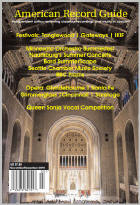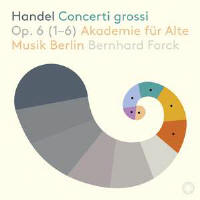Texte paru dans: / Appeared in:
Pentatone |
|
|
Outil de traduction ~ (Très approximatif) |
|
|
Reviewer: John
W. Barker This new recording by Forck raises two particular considerations. First, it offers only half of the Op. 6: Nos. 1-6. In this respect, it echoes a parallel release by the Freiburg Baroque Orchestra under Gottfried von der Golz (Aparte 190: M/J 2019), which presents only 1-6 of the Opus 6 by Corelli. It is not clear either in that or in this new Handel release if the remainder will be taken up by these performers.
But Von der Golz’s Corelli
release introduces another factor. Both the Corelli and Handel Opp. 6 were
published as for strings and continuo only. But there is evidence that
Corelli used at least some of these concertos as introductions to theatrical
pieces and apparently employed some winds. Going on those hints, Von der
Golz is rather adventurous in adding such parts in his Corelli recording. Now, we know that Handel used these Op. 6 concertos as fillers in his theatrical performances, and we have just scraps of evidence of the introduction of two oboes (with balancing bassoon) but just duplicating string parts. (Whereas the Op. 3 concertos are pastiches, taking music from earlier Handel stage works, the Op. 6 concertos, some borrowings from other composers aside, are pretty consistently original works by Handel.) Forck follows these clues and uses the winds in Nos. 1, 2, 5, and 6. As it happens, this “theatrical” life of these concertos has been explored in recordings already, first in individual concerto recordings but then in no less than three complete sets: Kevin Mallon (Naxos 555738), Jan Willem de Vriend (Challenge 72570), and Giovanni Antonioni (Oiseau-Lyre 478 0319), all 3CD, and all with period playing. I have compared them in some detail in S/O 2013. Forck uses the winds with some prominence, but I am just a little put off by his piercing violin sound. I prefer Antonioni’s among the full sets, but this kind of treatment remains an open field.
For people who don’t want to
bother with period playing of any kind, there are still the full
modern-instrument recordings of both ets under the suave Neville Marriner,
variously released but most conveniently combined in a set from Decca (475
8673, 3CD: M/A 2008)—lovely, if you can find it. | |
|
|
|
|
Cliquez l'un ou l'autre
bouton pour découvrir bien d'autres critiques de CD |
|




